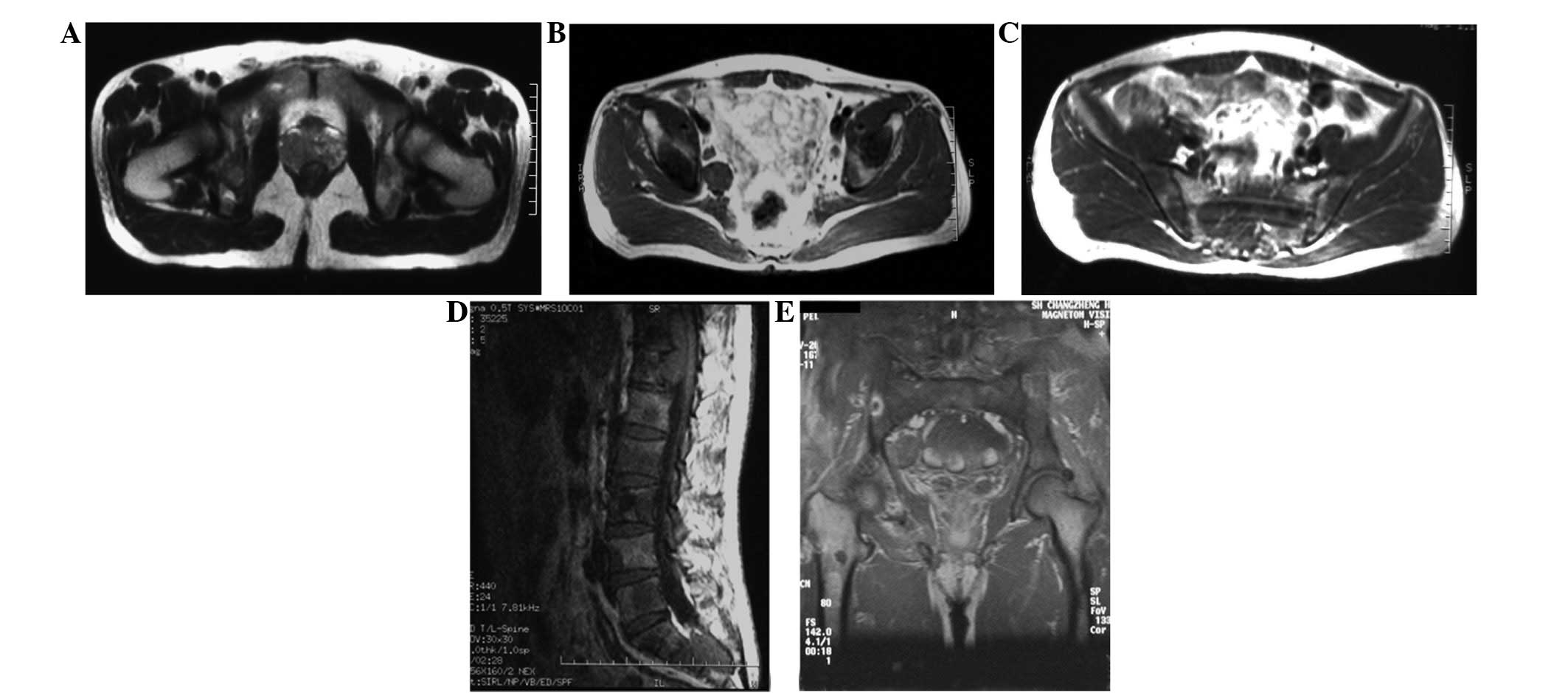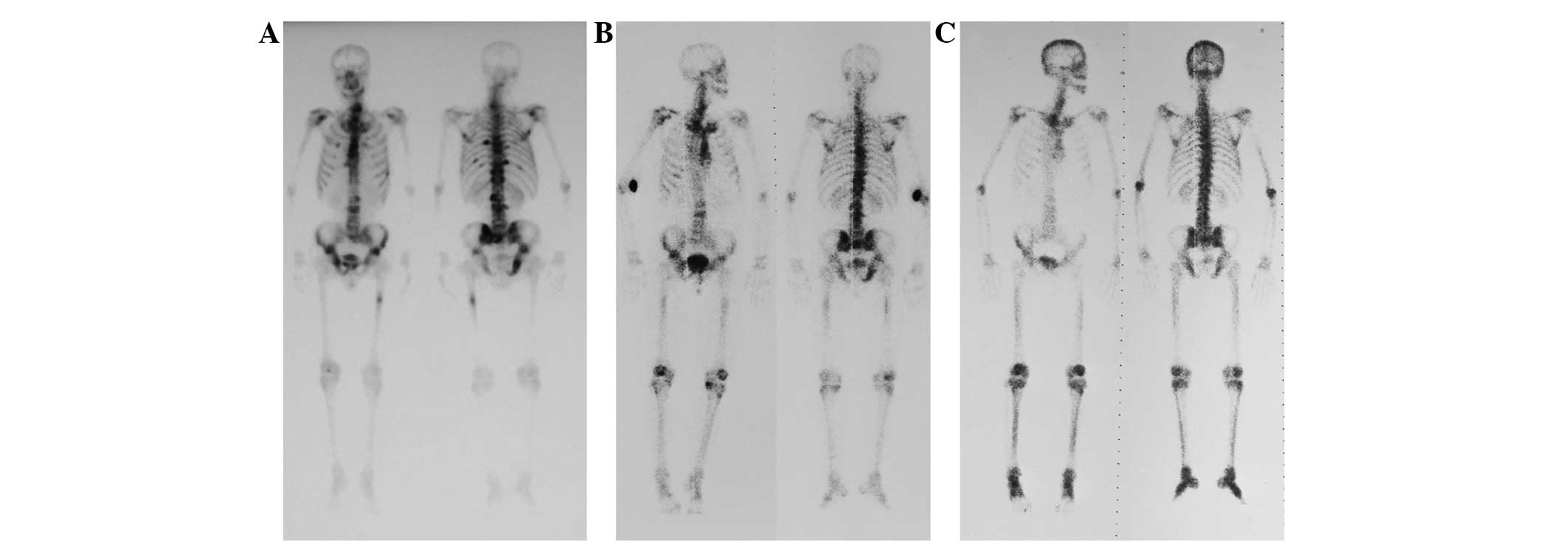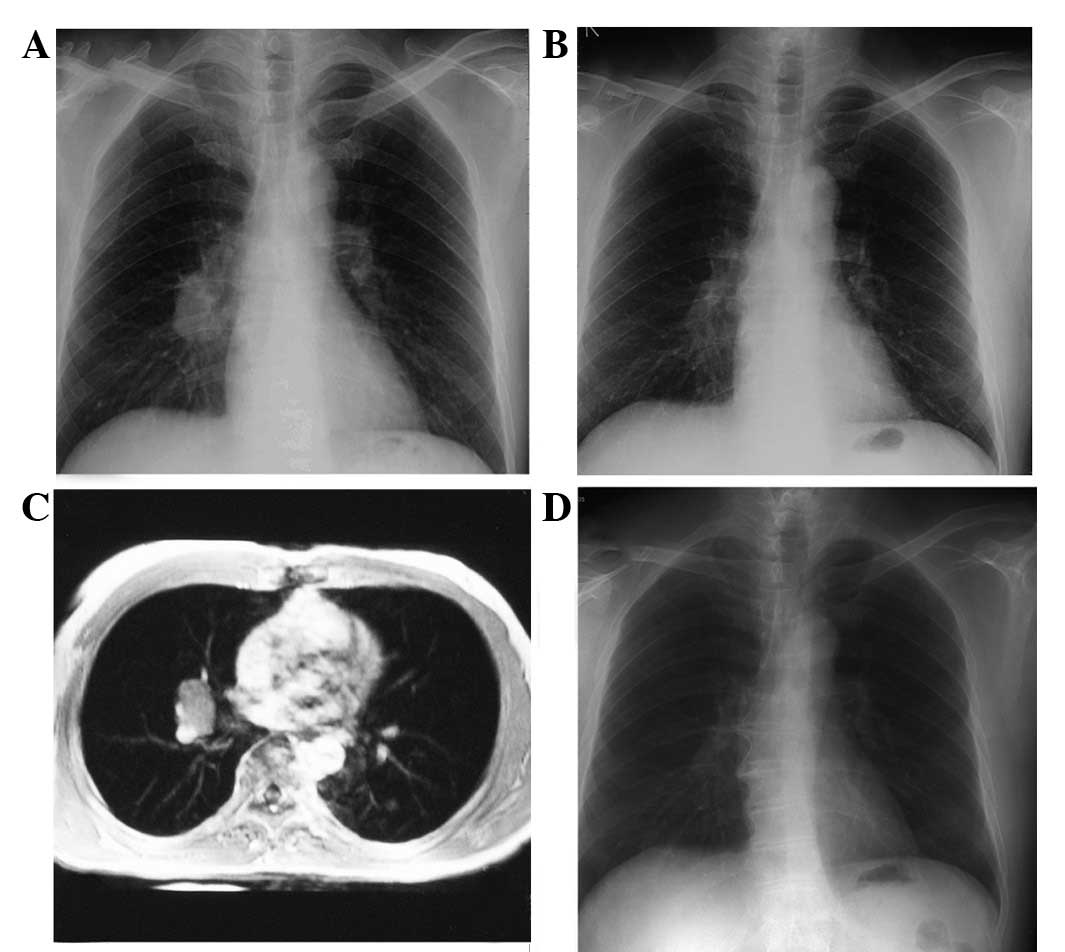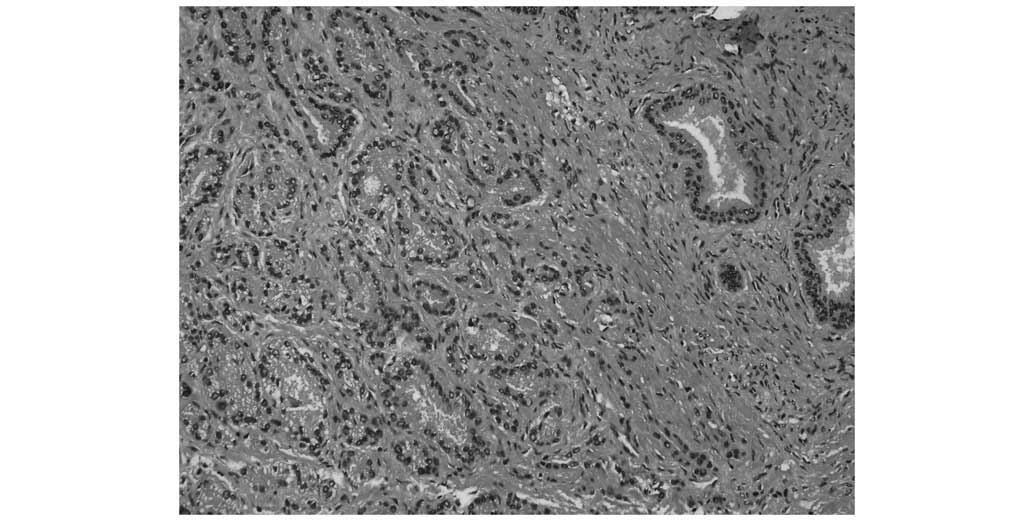|
1.
|
Siegel R, Naishadham D and Jemal A: Cancer
Statistics, 2012. CA Cancer J Clin. 62:10–29. 2012. View Article : Google Scholar
|
|
2.
|
Boyle P and Ferlay J: Cancer incidence and
mortality in Europe, 2004. Ann Oncol. 16:481–488. 2005. View Article : Google Scholar : PubMed/NCBI
|
|
3.
|
Attard G, Reid AH, Yap TA, Raynaud F,
Dowsett M, Settatree S, Barrett M, Parker C, Martins V, Folkerd E,
Clark J, Cooper CS, Kaye SB, Dearnaley D, Lee G and de Bono JS:
Phase I clinical trial of a selective inhibitor of CYP17,
abiraterone acetate, confirms that castration-resistant prostate
cancer commonly remains hormone driven. J Clin Oncol. 26:4563–4571.
2008. View Article : Google Scholar
|
|
4.
|
Kantoff PW, Higano CS, Shore ND, Berger
ER, Small EJ, Penson DF, Redfern CH, Ferrari AC, Dreicer R, Sims
RB, et al IMPACT Study Investigators: Sipuleucel-T immunotherapy
for castration-resistant prostate cancer. N Engl J Med.
363:411–422. 2010. View Article : Google Scholar : PubMed/NCBI
|
|
5.
|
Pezaro C and Attard G: Prostate cancer in
2011: redefining the therapeutic landscape for CRPC. Nat Rev Urol.
9:63–64. 2012. View Article : Google Scholar : PubMed/NCBI
|
|
6.
|
Aus G, Robinson D, Rosell J, Sandblom G
and Varenhorst E; South-East Region Prostate Cancer Group: Survival
in prostate cancer outcomes from a prospective, population-based
cohort of 8887 men with up to 15 years of follow-up: results from
three countries in the population-based National Prostate Cancer
Registry of Sweden. Cancer. 103:943–951. 2005.
|
|
7.
|
Peyrí Rey E: Regression bone metastases in
patient with prostatic cancer. Actas Urol Esp. 32:10502008.(In
Spanish).
|
|
8.
|
Kumar P, Duarte J and Pati J: Metastatic
prostate cancer presenting as diplopia with regression of signs
with hormone manipulation. Br J Hosp Med (Lond). 66:6462005.
View Article : Google Scholar : PubMed/NCBI
|
|
9.
|
Hoshi S, Ohyama C, Hagisawa S, Ono K,
Satoh M, Saito S, Fukuzaki A and Arai Y: Complete regression of
bone metastases on super bone scan, by low-dose cisplatin, UFT,
diethylstilbestrol diphosphate, and dexamethasone in a patient with
hormone-refractory prostate cancer. Int J Clin Oncol. 8:118–120.
2003. View Article : Google Scholar
|
|
10.
|
Weiss K, Köck HH, Atefie K and Sinzinger
H: Complete scinti-graphic lesion regression after single
153Sm-EDTMP therapy in prostate cancer. Rev Esp Med Nucl.
20:311–312. 2001. View Article : Google Scholar : PubMed/NCBI
|
|
11.
|
Ameur A, Touiti D, el Mostarchid B, el
Alami M, Jira H and Abbar M: Brain metastasis of prostatic cancer:
regression under hormonal treatment. Prog Urol. 11:1298–1301.
2001.(In French).
|
|
12.
|
Gayet R and Curtillet H: Regression of
pulmonary metastases from prostatic cancer after treatment with
estrogens. J Urol Nephrol (Paris). 80:709–715. 1974.(In
French).
|
|
13.
|
Turner J and Chaudhary U: Dramatic
prostate-specific antigen response with activated hemicellulose
compound in metastatic castration-resistant prostate cancer.
Anticancer Drugs. 20:215–216. 2009. View Article : Google Scholar
|
|
14.
|
Lundgren R: Flutamide as primary treatment
for metastatic prostatic cancer. Br J Urol. 59:156–158. 1987.
View Article : Google Scholar : PubMed/NCBI
|
|
15.
|
Delaere KP and Van Thillo EL: Flutamide
monotherapy as primary treatment in advanced prostatic carcinoma.
Semin Oncol. 18(5 Suppl 6): 13–18. 1991.PubMed/NCBI
|
|
16.
|
National Comprehensive Cancer Network: The
NCCN clinical practice guidelines in oncology 2011: prostate cancer
version 1: clinical practice guidelines in oncology. http://www.nccn.org/professionals/physician_gls/pdf/prostate.pdf.
Accessed Jan 12, 2013.
|
|
17.
|
Ohlson N, Bergh A, Nygren K, Stattin P and
Wikström P: The magnitude of early castration-induced primary
tumour regression in prostate cancer does not predict clinical
outcome. Eur Urol. 49:675–683. 2006. View Article : Google Scholar : PubMed/NCBI
|
|
18.
|
Shelke AR and Mohile SG: Treating prostate
cancer in elderly men: how does aging affect the outcome? Curr
Treat Options Oncol. 12:263–275. 2011. View Article : Google Scholar : PubMed/NCBI
|
|
19.
|
Feldman BJ and Feldman D: The development
of androgen-independent prostate cancer. Nat Rev Cancer. 1:34–45.
2001. View
Article : Google Scholar : PubMed/NCBI
|
|
20.
|
Taplin ME, Bubley GJ, Shuster TD, Frantz
ME, Spooner AE, Ogata GK, Keer HN and Balk SP: Mutation of the
androgen-receptor gene in metastatic androgen-independent prostate
cancer. N Engl J Med. 332:1393–1398. 1995. View Article : Google Scholar : PubMed/NCBI
|
|
21.
|
de Bono JS, Logothetis CJ, Molina A,
Fizazi K, North S, Chu L, Chi KN, Jones RJ, Goodman OB Jr, Saad F,
et al COU-AA-301 Investigators: Abiraterone and increased survival
in metastatic prostate cancer. N Engl J Med. 364:1995–2005.
2011.
|
|
22.
|
Scher HI, Halabi S, Tannock I, Morris M,
Sternberg CN, Carducci MA, Eisenberger MA, Higano C, Bubley GJ,
Dreicer R, et al Prostate Cancer Clinical Trials Working Group:
Design and end points of clinical trials for patients with
progressive prostate cancer and castrate levels of testosterone:
recommendations of the Prostate Cancer Clinical Trials Working
Group. J Clin Oncol. 26:1148–1159. 2008. View Article : Google Scholar
|
|
23.
|
Bubley GJ, Carducci M, Dahut W, Dawson N,
Daliani D, Eisenberger M, Figg WD, Freidlin B, Halabi S, Hudes G,
et al: Eligibility and response guidelines for phase II clinical
trials in androgen-independent prostate cancer: recommendations
from the Prostate-Specific Antigen Working Group. J Clin Oncol.
17:3461–3467. 1999.
|
|
24.
|
Nayyar R, Sharma N and Gupta NP:
Prognostic factors affecting progression and survival in metastatic
prostate cancer. Urol Int. 84:159–163. 2010. View Article : Google Scholar : PubMed/NCBI
|
|
25.
|
Collette L, de Reijke TM and Schröder FH;
EORTC Genito-Urinary Group: Prostate specific antigen: a prognostic
marker of survival in good prognosis metastatic prostate cancer?
(EORTC 30892). Eur Urol. 44:182–189. 2003. View Article : Google Scholar : PubMed/NCBI
|
|
26.
|
Hussain M, Tangen CM, Higano C,
Schelhammer PF, Faulkner J, Crawford ED, Wilding G, Akdas A, Small
EJ, Donnelly B, et al Southwest Oncology Group Trial 9346
(INT-0162): Absolute prostate-specific antigen value after androgen
deprivation is a strong independent predictor of survival in new
metastatic prostate cancer: data from Southwest Oncology Group
Trial 9346 (INT-0162). J Clin Oncol. 24:3984–3990. 2006. View Article : Google Scholar
|
|
27.
|
Johansson JE, Sigurdsson T, Holmberg L and
Bergström R: Erythrocyte sedimentation rate as a tumor marker in
human prostatic cancer. An analysis of prognostic factors in 300
population-based consecutive cases. Cancer. 70:1556–1563. 1992.
View Article : Google Scholar
|
|
28.
|
Scher HI, Jia X, de Bono JS, Fleisher M,
Pienta KJ, Raghavan D and Heller G: Circulating tumour cells as
prognostic markers in progressive, castration-resistant prostate
cancer: a reanalysis of IMMC38 trial data. Lancet Oncol.
10:233–239. 2009. View Article : Google Scholar : PubMed/NCBI
|
|
29.
|
Goodman OB Jr, Symanowski JT, Loudyi A,
Fink LM, Ward C and Vogelzang NJ: Circulating tumor cells as a
predictive biomarker in patients with hormone-sensitive prostate
cancer. Clin Genitourin Cancer. 9:31–38. 2011. View Article : Google Scholar : PubMed/NCBI
|
|
30.
|
Vishnu P and Tan WW: Update on options for
treatment of meta-static castration-resistant prostate cancer. Onco
Targets Ther. 3:39–51. 2010.PubMed/NCBI
|
|
31.
|
Molassiotis A, Fernadez-Ortega P, Pud D,
Ozden G, Scott JA, Panteli V, Margulies A, Browall M, Magri M,
Selvekerova S, et al: Use of complementary and alternative medicine
in cancer patients: a European survey. Ann Oncol. 16:655–663. 2005.
View Article : Google Scholar : PubMed/NCBI
|
|
32.
|
Lin YH, Chen KK and Chiu JH:
Coprescription of chinese herbal medicine and Western medications
among prostate cancer patients: a population-based study in Taiwan.
Evid Based Complement Alternat Med. 2012:1470152012.PubMed/NCBI
|
|
33.
|
Lin YH, Chen KK and Chiu JH: Use of
Chinese medicine among prostate cancer patients in Taiwan: a
retrospective longitudinal cohort study. Int J Urol. 18:383–386.
2011. View Article : Google Scholar : PubMed/NCBI
|
|
34.
|
Wang L, Zhou GB, Liu P, Song JH, Liang Y,
Yan XJ, Xu F, Wang BS, Mao JH, Shen ZX, et al: Dissection of
mechanisms of Chinese medicinal formula Realgar-Indigo naturalis as
an effective treatment for promyelocytic leukemia. Proc Natl Acad
Sci USA. 105:4826–4831. 2008. View Article : Google Scholar : PubMed/NCBI
|
|
35.
|
Lam W, Bussom S, Guan F, Jiang Z, Zhang W,
Gullen EA, Liu SH and Cheng YC: The four-herb Chinese medicine
PHY906 reduces chemotherapy-induced gastrointestinal toxicity. Sci
Transl Med. 2:45–59. 2010.PubMed/NCBI
|
|
36.
|
Liang HL, Xue CC and Li CG: Regression of
squamous cell carcinoma of the lung by Chinese herbal medicine: a
case with an 8-year follow-up. Lung Cancer. 43:355–360.
2004.PubMed/NCBI
|
|
37.
|
Cheng HM and Tsai MC: Regression of
hepatocellular carcinoma spontaneous or herbal medicine related? Am
J Chin Med. 32:579–585. 2004. View Article : Google Scholar : PubMed/NCBI
|
|
38.
|
Scher HI and Kelly WK: Flutamide
withdrawal syndrome: its impact on clinical trials in
hormone-refractory prostate cancer. J Clin Oncol. 11:1566–1572.
1993.PubMed/NCBI
|



















